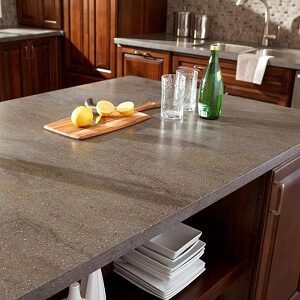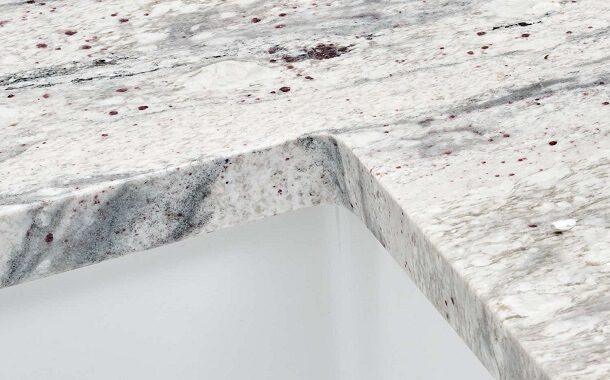The Cost Difference Between Corian and Granite Countertops
Last Updated on December 27, 2023
Written by CPA Alec Pow | Content Reviewed by ![]() CFA Alexander Popinker
CFA Alexander Popinker
One of the most important elements in the creation of modern kitchens is the worktop in the endowment of the furniture set. Its choice is made according to 3 criteria: appearance, durability, and price. And, of course, every owner wants to choose the best option, made from the best material available on the market, which gives them the guarantee that the chosen countertop will keep its appearance, texture, and shape for as long as possible.
Depending on the information he has access to, on the budget he has, and also on the style of kitchen, each owner chooses the material he considers the best for fulfilling the function of the countertop. The first positions in the ratings made over time by various companies specialized in the manufacture of kitchen furniture are held by granite countertops and Corian countertops. As a result, we decided to focus on granite and Corian today, trying to find out which of the two materials features more pros.
How much do granite and Corian countertops cost?
If you want a granite countertop for your kitchen then you should plan on spending anywhere between $55 and $105 per square foot, including installation. So, if your countertop has a surface of 30 square feet (that is fairly standard), your bill will be anywhere between $1,650 and $3,150. Obviously, you will have to pay an additional cost for the optional features such as backsplashes or fancy edges.
The cost of the Corian countertops depends on the color. Their price starts at around $55 per square foot and goes up to $155 per square foot. There are situations when Corian is cheaper than granite, or on the contrary, more expensive. However, it is recommended to compare their costs before deciding which one to choose.
Granite countertop details
Until recently, granite countertops occupied the first position in the top preferences of customers who really wanted natural stone in the kitchen decor and for whom the acquisition costs were not a problem. These are extremely good-looking and available in many colors and shades.
As more and more people have opted for granite countertops their price has decreased slightly. However, depending on the model, color, hardness, treatments applied by the manufacturer, the shape (curved, linear, etc.), the price of the countertop may increase.
Advantages
– The unique look. Being a natural material, you can’t find two pieces of granite that look the same, which means that your countertop will be unique.
– Large variety of colors. It is easy to match and can be used with all styles of designs.
You might also like our articles about the cost of Labradorite countertops, Cambria Countertops, or Granite Countertops.
– Strength and durability. Granite countertops stand out for their durability and long life. Of course, in order to prolong its existence, the surface of the countertop must be covered with a special varnish, which seals its pores.
– Heat resistant. Granite does not deteriorate in direct contact with a heat source: e.g. a hot pot.
Disadvantages
– Needs resealing. Granite countertops require the application of a layer of fresh varnish to keep the pores of the work surface closed and to prevent staining.
– They are not eco-friendly. It takes thousands of years for nature to produce a new piece of granite. And the world’s existing granite sources are finite and often over-exploited. Therefore, granite (like marble) is considered an unsustainable source of building materials and should be used sparingly and with respect for the environment. Which is not really the case.
– In case of chipping or damage, the repair of the damaged surface can only be done by specialists.
Corian countertop details
 Corian® is an innovative material invented in the late 1960s and manufactured by the DuPont company. It is used both indoors and outdoors – from bathrooms and kitchens, building facades, touch panels, or finishing surfaces, to furniture and lighting.
Corian® is an innovative material invented in the late 1960s and manufactured by the DuPont company. It is used both indoors and outdoors – from bathrooms and kitchens, building facades, touch panels, or finishing surfaces, to furniture and lighting.
The use of Corian in interior and exterior design is very wide. Most often we make kitchen countertops out of it – resistant to scratches, washing, moisture, water, and high temperatures (although, of course, you should never put hot dishes directly on the countertop).
Advantages
– Easy to clean. Corian furniture has been specially designed to be easy to maintain, using materials that are accessible to anyone. All you need is a damp cotton cloth and a solution to clean the surfaces to make it look special and shiny, which makes it so popular for everyone.
– Reparable. Did you know that Corian furniture can be repaired with almost imperceptible marks, even when it has been partially damaged by very strong chemicals – such as strong acids, ketones, or solvents? It is one of the great advantages of this material compared to others, similar ones.
– Non-porous. Corian is a composite material designed specifically to have this property: liquids cannot penetrate its structure, even when the exposure is long. It is a feature that recommends it to be used in bathrooms and kitchens.
– Non-toxic. Corian is an inert, non-toxic material that does not emit gases under normal temperature conditions. Even after burns, the resulting compounds do not contain toxic halogenated gases. One more reason to opt for Corian countertops.
Disadvantages
– The price. The biggest limitation of Corian and similar composite materials is their high price. For many investors, such a price is prohibitive, some, however, pay attention primarily to the parameters of resistance.
– Damaged by heat. It is not as heat-resistant as granite, so it can get stained if extremely hot objects are placed on the countertop.
– Not that resistant. Does not have the highest hardness (e.g. compared to granite), and strong blows with heavy or sharp objects can damage the surface.


Leave a Reply
Want to join the discussion?Feel free to contribute!